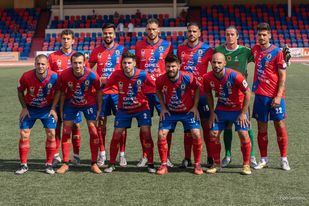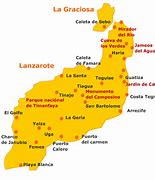day four of five of Sidetracks & Detours virtually Free Fiesta On Lanzarote: WE ARE READY AND WAITING
READY AND WAITING ON LANZAROTE
by Norman Warwick.
First-time visitors to Lanzarote from the UK seem to be struck by the island´s lack of grass. They don´t realise how proud we are of the fact that the island annually turns green in January / February after the yearly rainfall that most UK visitors would probably consider just a summer shower. Nevertheless, we should confess to the fact that the green we see at this time is not grass as such, but is in fact made of sterner stuff.

These short-stay green spots are also only usually found in areas that rest in the shelter of our mountains. Many of these grasses are actually cereals that were once cultivated on the island and / or now serve as forage crops for the goat herds you will see on Lanzarote, that provide us with so much milk, cheese and meat.
Some of this kind of ´grass´ has even been planted on Lanzarote´s two golf courses and has been integrated into some of the parks on the island.

but UD Lanzarote play football on it
The football pitches on the island, (of which there are many more than you might think) are not made of grass and, as a season ticket holder at both clubs for several years I can vouch for the fact that at U.S. Yaiza and at U.D. Lanzarote the ´pitches´ not only seem to have a different texture, but also seem to behave differently. Of course its been so long since we were last allowed in to watch a match I have almost forgotten what a football looks like, let alone the pitch, but I would say whatever cloning has gone in to the conditioning of these pitches seem generally to increase the pace of a game and as a by-product improve the skills of the players. Such pitches are available and affordable only to municipal or semi-professional teams so the kids at school are learning to play on the beaches or rock hard surfaces. As I often remind myself, ´on Lanzarote, there is no soft place to fall´,… and no safe place to be fouled.
Some readers might remember how pampas grass became massively popular in the UK during the later twentieth century. However, the fact I am about to impart I have only just learned, and I can assure you that had I known then what I know now I would never have let my wife put pampas grass in our front room bay window. !

TV journalist Marielle Frostrop (left) allegedly received several salacious enquiries back in the nineteen eighties after growing a clump of pampas (an activity which sounds like a euphemism as it is) outside her home, not realising, she said, that this was a signal that the wife swappers were in town in much the same way as a sudden burst of fireworks today signals the arrival of the local drug dealer ! Of course one, or both, of these allusions might be merely a self-perpetuating urban myth.

Our Lanzarote pampas grass has none of those hidden meanings whatsoever, although I would like to have lost my car keys, or my wife, in the fields of a kind of short, beautifully bleached pampas grass lookalike that has covered our meadows for the past month or so.
No one seems sure of what weather conditions have created this phenomenon. We don´t seem to have had any more than the average yearly rainfall, (though it might have fallen slightly more ferociously than usual) nor any gale like winds, though long, hot sunny days might be part of the process. At the moment, fields of light gold are covering the island, darkened and rippled only occasionally by shadows in the dancing wind.
Something reminded me the other day about how my dad and my godfather, Billy Hare, both of whom made good from humble beginnings, often used to hold comedic conversations about the deprivation they each ´suffered´ as kids. My dad´s favourite line was that he didn´t learn what a banana was until he was fourteen.
These days of course, after a year and counting of covid, people in every country in the world have tales to tell of deprivation, but my real fear is for those countries who might be left deprived by the greed of the so called more developed nations.
Changing Spain, modernizing it and preparing it for the next decade are the objectives of the ‘Recovery, Transformation and Resilience Plan’ to be presented next month to the European Commission.

Pedro Sánchez, (left) President Of Spain, has already announced that almost 70,000 million of European funds will be allocated to public investments between 2021 and 2023. Obviously, this investment will be intended, among other things, to re-generate industry across the country and develop an initial plan to lay the foundations for the new Spain or the Spain of the future. Some of that money, though, is intended for the recovery of The Canary Islands.
However, here in Lanzarote, we have no real industry other than tourism and we have no idea yet of if or when that industry, currently dormant, might be re-started. Because we don´t have an industry-profile doesn´t and shouldn´t mean that the island be deprived of any structural funds available. The truth is that Lanzarote dare not and must not miss the opportunity it has with these structural funds to re-invent or develop new industries, as this last year has clearly demonstrated how dangerous it is to be only a service-industry nation.
Lancelot Digital (a major news service and voice here) rightly points out in today´s edition that Lanzarote cannot throw away that money, or that which comes from other funds in the next six or eight years, by simply developing roundabouts, walkways and pools for tourists who might never arrive. Nor should we waste time in what some might see as esoteric intellectual debates, say the organisation, ´arguing about the gender of angels´.
Lanzarote Digital, which I usually hear speaking only in a softly spoken and dispassionate voice, insist that the island represents itself and uses those funds to make the island work in several key respects. This means we should be looking ahead to the Lanzarote of 2030. In ten years, this must be a premium island in infrastructures that allows us to guarantee the operation of the only thing we have and we know how to do moderately well.
There are three main problems that Lanzarote has today and that cannot wait. Lancelot Digital identify those areas as being the supply water, the treated water and the improvement of the roads. We should start by modernizing the out-dated and leaky water supply network. Strengthening the production of renewable energies and a serious plan for phased undergrounding of the towers and telephone poles as required by an island declared a Biosphere Reserve are seen by the news provider as essential in not only saving our mortally wounded palm groves but also in preserving the landscape so loved by our tourists in the past.
Now is the right time for politicians and institutions to get to work, we are already late but there is still time if the batteries are put into operation. Then we can welcome back our tourists by offering a more modern and even more enjoyable holiday experience.
Between last Sunday and last Wednesday, the people of Lanzarote could see in the sky the spectacular flight and speed of combat aircraft of the Spanish Army. That was because we had the pilots and planes of the Eurofighters of Wing 11 of Morón carrying out the manoeuvers and practices framed in the Eagle Eye Air Defence exercise, where the pilots of the Spanish Air Force carried out real attack simulations.

Antonio Quijano, captain of the 11th Wing Detachment, (see badge, right) explains that “We have two fighters that are permanently assigned to these area surveillance tasks, in which we do not know what exercises might be activate, because the events are always managed from anywhere else. It is a drill, of course, and we are going to cover all the hours that the civil airport allows us. There are 18 hours of permanent activity and we have two fighters always in a state of readiness to take off within fifteen minutes. In recent days, the simulated threats that we have faced have been F18 that come from wing 46, whose base is the Gando air base, and also Delta 4, maritime surveillance aircraft that always operate from Gando. It is about training the point of improvisation´.
More than 2,000 soldiers will be activated in these manoeuvres that are held periodically throughout the Spanish territory´.

One of the saddest aspects of the pandemic on Lanzarote through2020 and thus far in 2021 is that a great deal of new development and exciting new build, although complete, has yet to open for business. This has most affected hotel projects not only in the major, coastal tourist areas, but also the hotels and companies in the capital Arrecife, that in recent years have revitalized and redirected their business markets. Their openings and re-launches will make the capital a more interesting place for tourists to visit.
The Miramar Hotel and the Lancelot Hotel closed in lockdown in March, but then they did manage to keep their doors open in months when the airport barely saw tourists pass by.
In this sense, Carlos Cruz, director of the Hotel Lancelot, points out that they ´opened in July of last year, a little to see how all this was evolving because the situation was quite complicated´, he says. ´We took advantage of the previous months, in which we were closed, to reform the hotel and from July to December of 2020 we have been working at 30 percent capacity restriction. When in January 2021 we went to phase 4, the situation got a little more complicated and we were left with only 15% occupancy available and we had to adjust the hotel again and now we are just in that situation, waiting for there to be more vaccines, more mobility and more tourism ´.
Mercedes Medina, director of the Hotel Miramar, agrees. ´It has been a hard year and we still have a few difficult months ahead. I think the key is in the vaccination programme now but it seems that the service is up and running and accelerating and that, surely, is the solution. It has been a very complicated year, I said, very complicated and after level 4, even more. The month of February was horrible ”.
The Arrecife Gran Hotel, the only five-star facility in the capital, chose to close its doors and undertake a facelift after 16 years open without interruption.
Luis Miguel Morales, director of the Arrecife Gran Hotel, explains that ´after a year closed due to the pandemic, we have taken advantage and made renovations to the hotel. We had been open for sixteen years and but have now had time to give the property a face lift. We have renovated spaces, changed curtains, painted rooms, always with the expectation of opening in a reinforced appearance and manner. We had a forecast of opening before the summer of 2021, but it will depend on how the tourist source markets evolve´.
Such businesses and their directors seem to have behaved sensibly and responsibly to ensure their survival. Nevertheless workers in less elevated positions have faced reduced hours, lower wages and at the same many of them were asked to perform in those reduced hours in front-line dealings with a frightened public.
Yurena Cabrera, Beatriz Bustos and Jezabel Fernández are three of the hundreds of supermarket cashiers on the island, who have already completed a year with hardly any rest, working during and after confinement. They are part of a profession that has served a year in the front-line and that has played an essential role, face to face with the public, often at close quarters at food shelves and till points. Such staff have never really been the centre of attention even as they continue to suffer, in many cases, from great job insecurity. Nevertheless, they have not even been as one of the essential professions on the vaccination schedule.
Yurena, Beatriz and Jezabel, work in Lanzarote, in two different super-market chains, in Costa Teguise, Arrecife and San Bartolomé. They have been behind the box for 14, 12 and 15 years.
´This has been a before and after,´ says Beatriz, who describes the news of the confinement as a shock.
The three women all acknowledge, and remember those first days of confinement:
´It was as if we were going to war´, they say, both because of the amount of extra things that had to be placed, and because of the attitude that had to be taken during the new social climate that evolved when covid hit.
´Of course we were afraid because we did not know when a client might be infected and so every day we lived in fear of being infected´.
Thankfully, however, none of the three have been infected, although, like almost everyone, the virus touched them closely. A deceased uncle, an infected son … and co-workers affected or quarantined by the protocols that were applied in the establishments to prevent the spread of the virus.
Yurana recalled that ´the early days of the pandemic were confusing. No one was wearing a mask. Its use was not mandatory and, in addition, there were not enough masks for everyone. One of my colleague said that she wanted them to give her a mask and they answered her no because it could give a bad impression and alarm customers, the truth was that the customers themselves, in the absence of masks, created imaginative improvisations to resolve the problem. One customer appeared with several superimposed napkins and another with one of those diving masks used for Scuba´.
As soon as the suspension of classes in the schools was announced, Yurena moved to La Vegueta with her family because she was not going to be able to take care of her children. In those early days, shortly before confinement, Jezabel was in Tenerife on vacation and recalls how afraid she was that she might not be able to get home before the airports were all closed. Beatriz remembers those days as a time were days when people “were crazy”, thinking that supermarkets were going to run out of supplies.
She remembers the panic buyers of the early days and how she wondered where so many people had come from. She still carries a vivid image of the supermarket aisles where only heads and baskets were seen sticking out from above. She recalls purchases of up to 600 euros, customers with three full carts and others who came in the morning and returned in the afternoon to fill their pantry again. During those days she remembers being stuck in her cashier´s position and not being able to leave it to re-stack shelves or other important jobs´.
After those working days they returned home very tired and with the added fear of the danger that they might infect their family. The news was ever-changing and confusing: they went without a mask, there was talk of the risk of contagion from touching the products … Jezebel says that on returning home every day she headed straight to the shower, before going near anyone in her family.
´Very sad´, says Yurena, ´not being able to kiss my little daughter, who didn’t understand why she couldn’t kiss me, of course´,
All three of the employees were witnesses to the calendar of disappearances of products from the shelves of supermarkets:

´In the first days, we would go out with the pallet to re-stock the shelves, but customers would wait for you at the door and they would take it from your hands. People stocked up first on toilet rolls, which I still don’t understand´, says Yurena.
After that, the flour and the yeast was bought up by people who started making homemade pastries.
´I saw a customer with six packets of yeast,´ remembers Beatrice.
Later, or simultaneously, it was the turn of the cleaning products. There came a time when, due to the shortage of bleach or disinfectant, customers took any other product, in addition to gloves, hydro-alcoholic gel, alcohol … And during the two months of confinement and also afterwards, beers and chocolate.
The most negative part, the store workers all agreed, was ´seeing how elderly people arrived who needed some of those products and could not find them, or a mother looking for wipes for her baby and that there were none.´
And, of course, these three women and their coilleagues had to put up with everything: insults almost daily, a lot of tension, angry faces and bad manners and repeated attitudes of non-compliance with the new rules:
Shop workers and cashiers had to frequently, but politely ask ‘put on your mask, please'”, to people who took off their masks to talk on the phone even as they were passing by the checkout ´as if they weren’t going to hear their caller because they were wearing the masks.´
Customers seemed to take a long time to become accustomed to social distancing even when shopping people and continued to touch touched the fruit, even without gloves.
Some clients took out their frustration or discomfort with these rules on the cashiers:
´If you reminded them about the mask, they would tell you that it was all just a lot of nonsense,´ the three ladies say.
Curiously, compared to other times, and despite the fact that social relationships were limited only to the cohabitants, in general, customers did not seem to have much desire to talk any more necessary. On the contrary, it was as if they were in a hurry, and had no patience. even becoming cross whenever a cashier wiped down the conveyor belt before serving them, as they were instructed to in the covid regulations, in an attempt to limit the spread of the infection between customers.
There were even customers who resisted having their temperature taken at the entrance or who did not want to put on the gloves because they claimed that this could increase the viral load. And there were even lawsuits and fights between clients.
But fortunately, we can perhaps look back on social behaviour being calmer and more civil than we might have feared and many customers encouraged serving-staff them and thanked them.
´And everyone has been adapting,´ is how the three female cashiers eventually summarised the situation..
Of course, a covid-affected life was continuing outside the supermarkets, too.
There were transportation problems with a much restricted bus service affecting workers and school-children, who had to cope with new homework regimes or online classes. There were concerns, too, about ERTE, health, and so on.
Whilst all three of these supermarket workers who have spoken about theses issues now agree that they are psychologically and physically tired, they have each found something positive take from the whole experience, with Beatriz saying that she feels ´more experienced´.
Vanessa Frahija, Secretary of Lanzarote Hospitality And Commerce says that ´a shop-worker´s job has become precarious,… multiplied by fifteen ! There is more instability, with two-month employment contracts and such. Few contracts for shop-workers enjoy incentivised benefits or any acknowledgement contractually of how their role is changed by the pandemic.
The commerce of the sector is affected too, of course, and as the economic consequences around the world are becoming increasingly apparent and evidenced by much reduced purchasing power of most customers.
Everyone, therefore, is waiting for the vaccination roll-out to continue and even improve its speed and then pray that improved health security begins to lead to the arrival of tourists.
Although we are British, and have lived on the island for only five years and therefore only just more than half way towards full rights, we were nevertheless contacted by our health centre and were offered our vaccinatinns last month which we gratefully accepted.
Lanzarote has always epitomised both the literal and figurative meaning of ´a warm welcome´ and you can be sure that as air-corridors are opened and you are able to land on our island again, you will notice our smiles even if we are still having to wear our masks!

Thank your being part our fourth of five days of Sidetracks & Detours ´virtually´ free Fiesta On Lanzarote. We hope this article, itself a slight diversion from our usual sidetracks & detours offers reassurance about how the island has coped with this pandemic and how it has retained its pride in striving to make itself as welcoming as ever to those tourists who return. There is evidence of new holiday experiences that will be offered and we a looking forward to sharing our arts and culture and cuisine with new and returning visitors. With that in mind, tomorrow we conclude our Free Fiesta On Lanzarote with a look at the kind of concerts and arts performances we are looking forward to deliver for your delight when you do get here in person.




Leave a Reply
Want to join the discussion?Feel free to contribute!